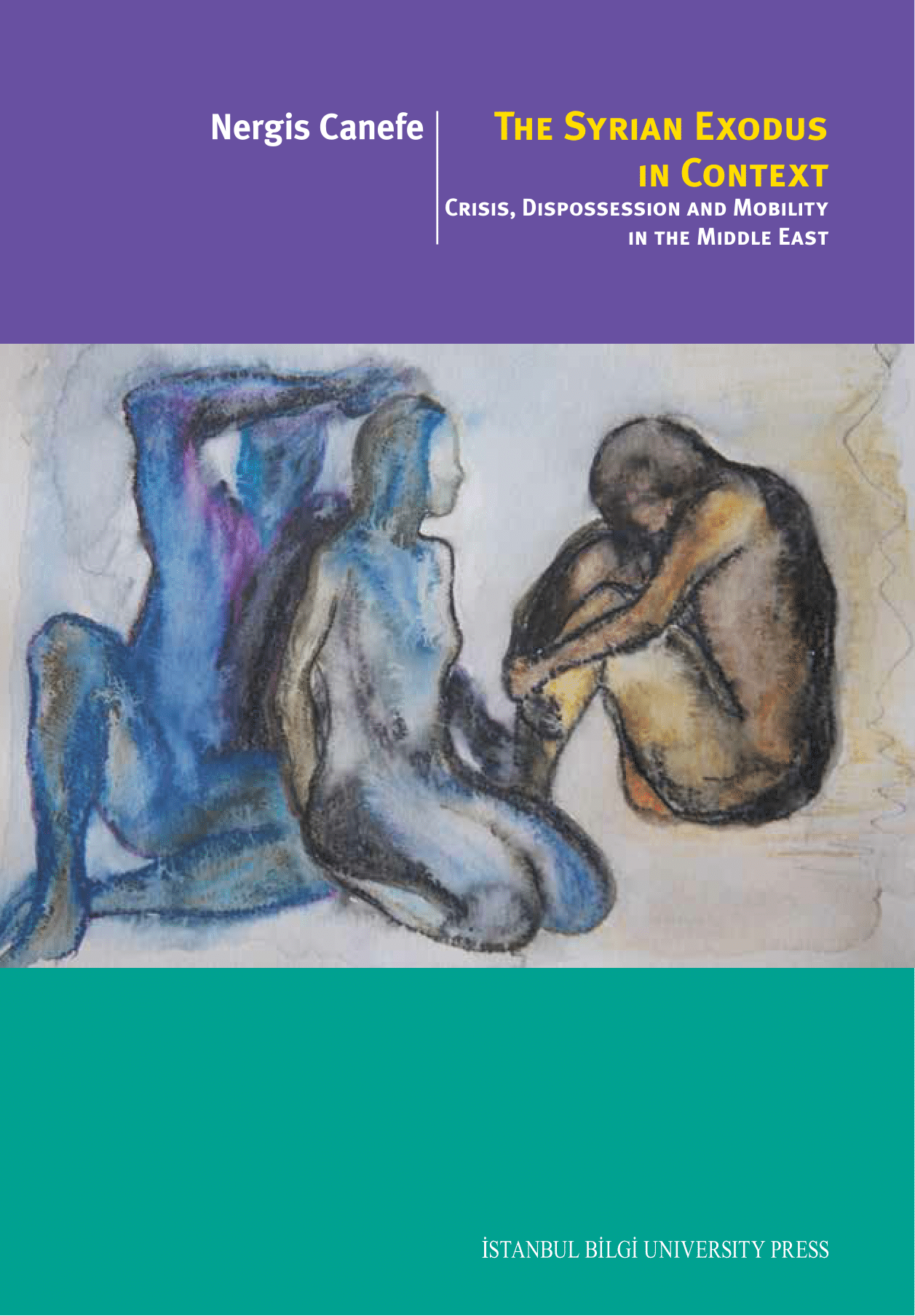
Syrian Exodus in Context: Crisis, Dispossession and Mobility in the Middle East
This book examines the Syrian crisis and exodus by focusing on the experiences of the dispossessed rather than the recipient states. Reintegration and resettlement after situations of mass displacement are generally long-term, multi-faceted and complex processes. Whether we are talking about acceptance in a new society as refugees, migrants, and guest workers, or returning home to post-conflict situations, each scenario involves both specific physical challenges and difficult encounters with broader political communities. The debate presented here on precarity and statelessness in terms of systemic denial of access to rights, or, their selective attribution to Syrians on the move, allows us to reconsider the Syrian exodus in a new framework that links forced migration, labor studies, citizenship and rights debates rather than isolating the refugee experience._x000D_
INTRODUCTION The Syrians are Coming?
Putting the Syrian Exodus in Context
Outline of the Book
CHAPTER I Rethinking the Middle East and North Africa outside the Blindfold of Area Studies
The Middle Eastern State as Parable
State and Violence: Multiple Legacies of Blameworthiness in the Middle East and North Africa
Here Today, Gone Tomorrow: Forced Migration as a Tool for Managing Dissent
Forced Migration in Aid of Statecraft in the Middle East: Examples
Forays into the Postcolonial Condition: Where is the Middle East?
Conclusion: Forced Migration as a Form of Organized Violence
CHAPTER II Migration as Necessity: Conceptualizing the European Response to the Syrian Exodus
Setting the Stage: Europe for Europeans Forever?
The Silence of Categories: Skilled, Unskilled, and None of the Above
The Context: Shadow Boxing at Fortress Europe?
The Syrian Case in the Larger Context
Numbers, Lists and Headcounts of the Dispossessed
Legal Ethics of Migration, Duty of Care, and Collective Moral Responsibility: A Difficult Conversation
Conclusion: Europe and Its Reflection on Water
CHAPTER III Redefining Sovereignty:
Myths and Realities about Forced Migration
in Contemporary Middle East
Human Security and Bare Life in the Middle East
Finding Nemo: Where is the Middle East?
Dispossession in the Fine Hour of Discontent: Refugees of the Middle East
The Exodus
Conclusion: Redefining Sovereignty at the Expense of Human Security
CHAPTER IV Managing the Exodus: Syrians in Turkey as Paradigm Shifters
Precarity Writ Large: A View from the Global South
Redefining Precarity as a Legal Precinct
The Limits of the Europeanization of the Turkish Migration Regulation Regime
“Birds of a Feather Flock Together”— Patterns of Irregular Migration in Turkey
Reforming the Turkish Labour Code, or Legalizing Precarity Just in Time
Conclusion
CHAPTER V Invisible Lives: Gender, Hyper-precarity and Syrian Refugee Women
Introduction
Precarity Anew: Gendered Hells and Heavens
Gender, Asylum and Precarity: Lineages of the Strong State in the Middle East
A Refugee, a Migrant, a Guest, an Illegal Resident, or a New Citizen? The Naming Rituals of Displacement in the Middle East
The Curious Case of Turkey
Invisible “Guests”: Syrian Women’s Precarious Lives on the Move
Conclusion
CONCLUSION The Arranged Marriage of Forced Migration and Statelessness in the Middle East
Sovereign Utopias and The Myth of the Middle Eastern Nation-State
Does a Tree Exist if no one Hears its Fall?
Definitional Conundrums: De Jure and De Facto Statelessness and Beyond
The Intricate Logic of How to Create a Stateless Person
And so this is the Middle East?
When Law is Mute....
Bibliography
First Publication of Preceding Articles
Index
For quite some time we had been awaiting such a book that will connect in a singular global theme the wars of our time, forced migration, and the emergence of precarious labour force throughout the world in this neoliberal age. Nergis Canefe’s Syrian Exodus in the context of the neoliberal crisis of the global state system and the resultant statelessness, dispossession, and mobility is that kind of book. It is profound. It does not waste vacuous words on humanitarianism and pious wishes for universal respect for human rights. It tells us what war means in real life, the destruction of all possible means of realisation of rights, and how the upheaval in West Asia and the North African region is redrawing boundaries, destroying old stable orders that were once the basis of citizenship, and the consequent emergence of statelessness on an unprecedented scale. The book’s merit lies in deciphering the crisis in the traditional discourse of refugee studies in the light of the current crisis of the state system and the global governance regime. It shows how after three decades of the end of the Second World War various forms of migration eroded citizenship as the basis of rights. Consequently, as the book explains, the traditional role of the nation-state as the harbinger of rights is also largely over. This book helps us to understand the all round precariousness signified by migration today: precarious state of rights, precarious nature of the legal remedies, precarious lives, and above all precarious forms of labour at the service of neoliberal capitalism. The Syrians have arrived in contemporary history as the great signifier of a viciously transforming age.
Professor Ranabir Samaddar, Mahanirban Calcutta Research Group
_Nergis Canefe’s timely book is an important contribution to the literature on the forced migration of Syrians as she shifts the focus of their displacement from European fears to the context of the Middle East and the countries that have received most of the refugees, primarily Turkey. Through the lenses of transitional justice and citizenship, Canefe exposes the long historical roots of the exodus and particularly sheds light on the trials and tribulations of undocumented, refugee and migrant Syrians. She argues that it is not necessary to wait for the end of a war to begin to address the causes and consequences of displacement and sets out strategies to move beyond a humanitarian response putting refugees themselves at the centre of the process to build a better future.
Professor Susan McGrath, Centre for Refugee Studies, York University
Nergis Canefe
1967’de Ankara’da doğdu. Ailesi köken olarak Selanik, Kamobat, Trabzon ve Elaziz’e dayanmaktadır. Lisans öğrenimini 1988 yılında Boğaziçi Üniversitesi’nde bitirdikten sonra aynı üniversitede Osmanlı Tarihi konusunda yüksek lisans derslerini tamamladı. 1991 yılında ABD’de Binghamton Üniversitesi ‘nden Tarihsel Sosyoloji dalında Immanu¬el Wallerstein ve Giovanni Arrighi’nin öğrencisi olarak yüksek lisans derecesi, 1998 yı¬lında Kanada’da York Üniversitesi’nden Howard Adelman ve Joseph Carens’in öğrencisi olarak Siyasi ve Toplumsal Düşünce Kuramları dalında Doktora derecesi aldı. 1998—2002 yılları arasında Londra Üniversitesi Tarihsel Araştırmalar Enstitüsü’nde ve London School of Economics Avrupa Çalışmaları Enstitüsü’nde kadrolu araştırmacı ve öğretim üyesi olarak çalıştı ve Anthony Smith’ in kurduğu Milliyetçilik ve Etnisiteler Grubu’nun asil üyeliğine kabul edildi. 2002-2003 akademik yılında İstanbul Bilgi Üni¬versitesi Sosyoloji ve Kültürel İncelemeler bölümlerinde yardımcı doçent kadrosunda ders verdi ve yüksek lisans tezleri yönetti. 2003 yılından beri Kanada’da York Üniversitesi Siyaset Bilimi bölümünde öğretim üyesi olarak çalışmaktadır. 2005 yılında Türkiye ve Kanada’da eşzamanlı olarak siyaset felsefesi ve siyası düşünce tarihi alanlarında do¬çent oldu. Aynı yıl içinde Kanada’da Osgoode Hail Hukuk Fakültesi’nde İnsanlığa Kar¬şı İşlenen Suçların Yargılanması ve İnsan Hakları Kuramları konusunda ikinci doktora¬sına başladı. Çalışma alanları karşılaştırmalı vatandaşlık ve milliyetçilik teoremleri, ai¬diyet kavramı, zorunlu göçler, hafıza ve göçmenlik durumu, azınlık haklarının hukuk¬sal ve normatif temelleri ve insanlığa karşı işlenen suçların uluslararası hukuktaki statüsü konularını kapsamaktadır. 1994’ten bu yana Türkçe ve İngilizcede çok sayıda maka¬le ve derlemeleri yayınlanmıştır. Kitapları arasmda Mehmet Uğur’la ortak Turkey and the European Integration (Routledge, 2005), ve William Satran’la ortak Comparative Perspectives on Jewish Diasporas (Berg, yakında basılacak) bulunmaktadır Fransızca ve Eski İbranice bilen Canefe, evli ve iki çocuk annesidir.
